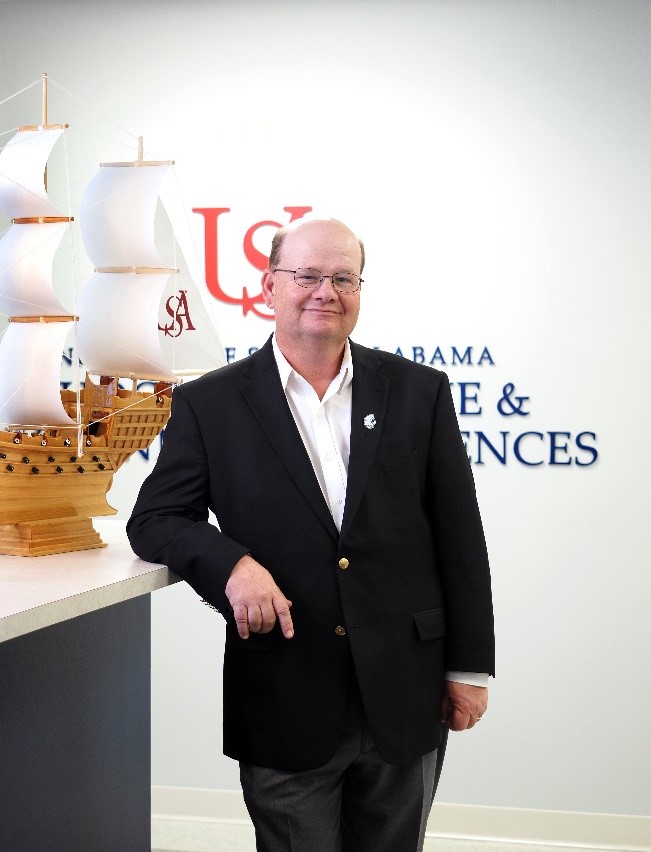Message from Director
 Welcome to the Stokes School of Marine and Environmental Sciences (SoMES) at the University
of South Alabama. There is no better place to study marine, coastal or watershed sciences.
SoMES geographic setting alone proves this – our backyard is the “North America Amazon”
(The Mobile Tensaw River Delta), the most bio-diverse region of North America and
our front yard is the fertile crescent of the Gulf of Mexico, which supports the richest
seafood and energy markets in the country. The wise stewardship of these natural resources
is critical to the socioeconomic fabric of coastal Alabama and the nation. Key to
addressing this need is the development of a well-trained scientific workforce and
continued advances in research and technology. SoMES offers undergraduate (BS in Marine
Sciences, BS in Environmental and Sustainability Sciences, and minors in both) and
graduate programs (MS and Ph.D. degrees in Marine Sciences, MS in Environmental Toxicology
and MS in Marine Conservation and Resource Management). Our faculty are world renowned
leaders in their fields with specializations in biological, chemical, physical and
geological oceanography, marine fisheries and ecology, conservation biology, restoration
ecology, environmental sociology, environmental policy, and much more. We study a
range of organisms from bacteria, archaea, and viruses to sharks and marine mammals.
SoMES faculty members continue to examine some of the most controversial subjects
in the management of marine and coastal ecosystems including the current management
of marine fisheries, causes and consequences of global climate change, and sustainability
of coastal development. Faculty members share the results of their studies by publishing
in the leading journals in Marine and Environmental Sciences, serving on local, regional,
national and international advisory boards, and reaching out to the general public
through extensive outreach and education activities.
Welcome to the Stokes School of Marine and Environmental Sciences (SoMES) at the University
of South Alabama. There is no better place to study marine, coastal or watershed sciences.
SoMES geographic setting alone proves this – our backyard is the “North America Amazon”
(The Mobile Tensaw River Delta), the most bio-diverse region of North America and
our front yard is the fertile crescent of the Gulf of Mexico, which supports the richest
seafood and energy markets in the country. The wise stewardship of these natural resources
is critical to the socioeconomic fabric of coastal Alabama and the nation. Key to
addressing this need is the development of a well-trained scientific workforce and
continued advances in research and technology. SoMES offers undergraduate (BS in Marine
Sciences, BS in Environmental and Sustainability Sciences, and minors in both) and
graduate programs (MS and Ph.D. degrees in Marine Sciences, MS in Environmental Toxicology
and MS in Marine Conservation and Resource Management). Our faculty are world renowned
leaders in their fields with specializations in biological, chemical, physical and
geological oceanography, marine fisheries and ecology, conservation biology, restoration
ecology, environmental sociology, environmental policy, and much more. We study a
range of organisms from bacteria, archaea, and viruses to sharks and marine mammals.
SoMES faculty members continue to examine some of the most controversial subjects
in the management of marine and coastal ecosystems including the current management
of marine fisheries, causes and consequences of global climate change, and sustainability
of coastal development. Faculty members share the results of their studies by publishing
in the leading journals in Marine and Environmental Sciences, serving on local, regional,
national and international advisory boards, and reaching out to the general public
through extensive outreach and education activities.
USA and the State of Alabama have made major investments in Marine and Environmental Sciences. Our newly renovated facilities on campus offer 35,000 sq feet of modern research and teaching labs, student study and meeting areas, faculty offices and conference rooms, and a new state-of-the-art analytical facility. Key to the success of the SoMES is our strong partnerships with the Dauphin Island Sea Lab, which houses many of our research labs and offices. The School also utilizes and train our students on the latest technology from autonomous under water ocean gliders (AUV’s) and remotely operated vehicles (ROV’s) to instrumentation that measures almost any chemical and physical parameter in the ocean and costal areas.
We are a student first School that provides students at all stages with the skills necessary to change the world. The School is highly competitive for federal and state research grants averaging $4-12 million in new grant funding a year and over $18 million total in active grants. This funding allows us to recruit excellent MS and Ph.D. students and provide exceptional opportunities for undergraduates to work in these exciting fields of study. Student interest in the program remains high and positions are highly competitive. Our graduates go on to amazing careers in academia, government, non-governmental organizations (NGO’s) and private industry.
If you have an interest in Marine or Environmental Sciences please consider joining us at USA. I invite you to explore our web site and contact faculty members whose interests align with yours.
Sincerely,
Sean P. Powers, Ph.D.
Angelia and Steven Stokes Endowed Chair in Environmental Resiliency
Director and Professor, Stokes School of Marine and Environmental Sciences


